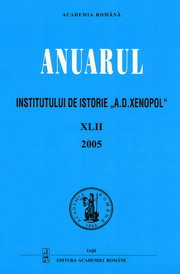„CHESTIUNEA BISERICEASCĂ” ÎN PRINCIPATELE UNITE ŞI REGATUL ROMÂNIEI ÎN OGLINDA DISCURSULUI IMPERIAL RUS (1860−1914): ÎNTRE CONTINUITATE ŞI TRANSFORMARE
THE “CHURCH QUESTION” IN THE UNITED PRINCIPALITIES AND THE ROMANIAN KINGDOM THROUGH THE LENS OF RUSSIAN IMPERIAL DISCOURSE (1860−1914): BETWEEN CONTINUITY AND CHANGE
Author(s): Andrei CuşcoSubject(s): History, Theology and Religion
Published by: Editura Academiei Române
Keywords: Russian Empire; Romania; imperial discourse; “church question”; “Catholic propaganda”; “Latinism”
Summary/Abstract: This article discusses the link between the domestic and foreign policy of the Russian Empire through the lens of the religious aspect. It is based on the case study of the “church question” in the United Principalities/Romania, highlighting the perceptions of this issue within Russian official and diplomatic circles. The argument is built upon the premise that religion was one of the main elements of the Russian imperial project, not only for legitimizing imperial expansion, but also for constructing and reproducing difference. Russia was governed by a multi-confessional establishment that devised special institutions and hierarchies for dealing with the religious diversity of its subjects. The dangers of “contamination,” apostasy and uncertain loyalty lurked in the background of imperial policies and often framed the authorities attitude towards “suspect” religious communities. Just as frequently, the Russian observers transferred their own fears and phobias generated within the empire to external contexts. I argue that the Russian perceptions of the Romanian case are a revealing example of this logic. The language and conceptual categories that emerged during the 1860s in the Russian Empire’s Western borderlands in connection with the “Polish Question” and the role of the Catholic clergy were reproduced in the Romanian case. The religious dimension provides a unique basis for an entangled history of the mutual Russian and Romanian perceptions. The quasi-obsessive threat of “Latinism” and the cliché of the pervasive danger of Catholic propaganda that dominated the Russian images of the Romanian church and society allowed the Russian observes to project the ideal vision of the Self through the inverted mirror of the Other. In the first decade of the 20th century, as the Russian-Romanian relations gradually improved, these discursive elements somewhat faded away, but they never disappeared entirely.
Journal: Anuarul Institutului de Istorie »A.D. Xenopol« - Iaşi
- Issue Year: LII/2015
- Issue No: 52
- Page Range: 269-285
- Page Count: 16
- Language: Romanian

